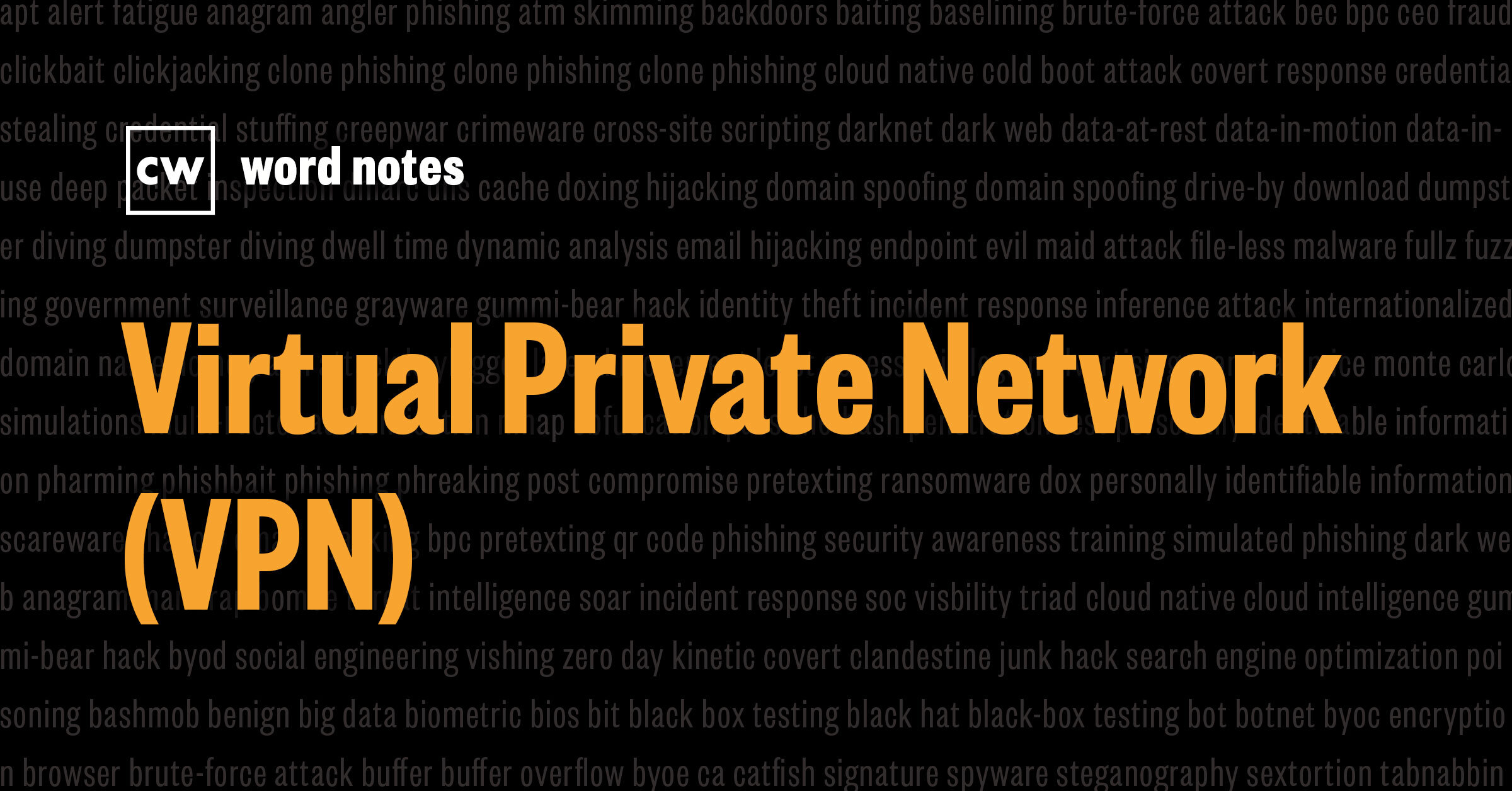
Virtual Private Network (VPN) (noun)
Rick Howard: The word is: VPN.
Rick Howard: Spelled: V as in virtual, P is in private, and N as in network.
Rick Howard: Definition: A software, hardware or hybrid encryption layer between two devices on the network that makes the traffic between the sites opaque to the other devices on the same network.
Rick Howard: Example sentence: When PCMag ran a survey in 2018, they found that only 71% of 1,000 respondents had ever used a VPN at all.
Rick Howard: Context: VPNs can help you conceal your actual IP address, spoof your physical location and generally mask your online activity. This provides the user of the technology better anonymity in the public Wi-Fi spaces like your local Starbucks and may help people bypass the Internet censorship in countries that try to suppress free speech. Because of the tunneling aspect, it may also help users stream video content from countries that block international streaming services. If I live in New Jersey and want to connect to the Darknet or TOR, I may not want people to know that. By connecting directly to that network, anybody watching the Tor entry and exit nodes network traffic will see my local New Jersey IP address. But, if I first establish an encrypted tunnel connection with a VPN server in Tokyo let's say, anybody watching that TOR traffic will only see the Tokyo VPN servers IP address as the origin. I have masked my location.
Rick Howard: Nerd reference: In one of the first hacker movies, Sneakers, that debuted in 1992, Bishop, played by Academy Award winner Robert Redford, has to make a call to the NSA to make a deal. He knows that the NSA will trace the call. Whistler, played by David Strathairn, the blind telecommunications expert in, how cool is that, sets up multiple telephone connection points to confuse the NSA trace. He doesn't use VPNs because, you know, they haven't been invented yet and wouldn't be until 1994. But Whistler bouncing phone lines around the world is the same general idea. Besides Redford and Strathairn there in this clip, you're going to hear from Saturday Night Live alum Dan Aykroyd and Oscar winners Sidney Poitier and James Earl Jones of Darth Vader fame. See if you can pick them out.
David Strathairn: I'm going to bounce this call through nine different relay stations throughout the world and off two satellites. It'll be the hardest trace they've ever heard.
Robert Redford: Let's do it.
NSA: Fort Meade, Maryland. Good afternoon.
Robert Redford: Director of National Security Agency, director of operations, please.
NSA: What extension please?
Robert Redford: I'm sorry, I forget the number. Could I please have director of operations? It's very important.
NSA: What extension please?
Robert Redford: Setec Astronomy.
NSA: One moment, please.
David Strathairn: They started the trace.
James Earl Jones: Who is this, please?
Robert Redford: It's my dime, I'll ask the questions, who are you?
James Earl Jones: Let's say my name is Mr Abbott.
Dan Aykroyd: True.
David Strathairn: They made the second leg.
Robert Redford: Mr Abbott. Are you interested in Setec Astronomy?
James Earl Jones: I'm interested in all kinds of astronomy.
Robert Redford: Cute.
David Strathairn: They got the satellite in Tokyo. These guys are good.
Dan Aykroyd: 15 seconds.
Robert Redford: Can you guarantee my safety?
James Earl Jones: Where is the item?
Robert Redford: Can you guarantee my safety?
Five seconds.
James Earl Jones: Yes, I can guarantee your safety.
Dan Aykroyd: Bish, he's lying.
David Strathairn: Hang up. They've almost got us.
Dan Aykroyd: He's lying.
David Strathairn: Hang up, Bish.
Dan Aykroyd: He's lying. He's lying.
David Strathairn: Hang up.

